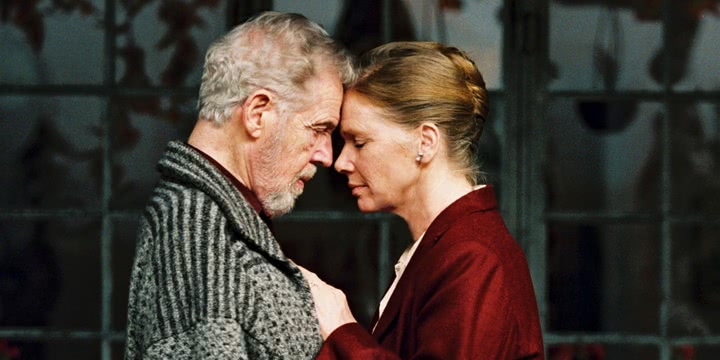What is there left to say about Ingmar Bergman? The legendary Swedish filmmaker is one of the few international film directors to achieve worldwide household name status; he’s practically synonymous with cinema as confrontation with – rather than escape from – one’s own inner demons. Though his films sometimes evade easy interpretation, they’re far from obscure – there was once, after all, a time when his 1957 landmark The Seventh Seal and its iconic chess-game-with-Grim-Reaper imagery was the subject of semi-recognisable parody in 1989’s Bill & Ted’s Excellent Adventure.
“How many films did he make? 40 films or something – it’s very difficult to leave any one out, you’d like to show all of them,” says David Stratton (whose celebrity, accrued from his work with Margaret Pomeranz on The Movie Show and its different incarnations, arguably eclipses Bergman’s in Australia) on the task of selecting ten titles for this year’s Essential Bergman program at Sydney Film Festival. Stratton’s involvement in the curation of the retrospective (he’ll also be in attendance at each of the ten screenings during the festival) lends a suitably personal lens through which to view Bergman’s rather imposingly canonical films.
Considering Bergman’s reputation as a harbinger of existential angst, it’s easy to forget his international breakthrough – 1955’s Smiles Of A Summer Night – was a comedy.
“I was a teenager at the time, I was 17,” says Stratton, detailing his first encounter with Bergman via the film. “I was already quite a film buff, I saw almost everything that opened in cinemas; of course, that was mostly from America or Britain, and almost nothing in the way of foreign language films. I’d never seen a Swedish film before, and it was actually shown at a film society, which I’d then joined as a way of seeing films I couldn’t see in regular cinemas. And the experience of seeing this film for the first time, with a very appreciative audience, had quite a staggering impact on me. It dealt with themes and situations that films just didn’t tackle in those days, and it did it with such a light touch – so humorous yet painful at the same time, and so elegantly done. It was quite a revelation.”
Despite his trail of consensus masterpieces – The Seventh Seal, Wild Strawberries, The Virgin Spring, Persona, Cries And Whispers, Fanny And Alexander, just to name a few playing as part of the retrospective – Bergman’s reputation was never completely secure, and a New York Times op-ed titled ‘Scenes From An Overrated Career’ (written by critic Jonathan Rosenbaum mere days after Bergman’s death in 2007) seemed to confirm an anti-Bergman backlash bubbling from the margins for some time.
“I think there were always critics who found fault with his work,” Stratton concedes. “The perennial question that any critics asked when his films were released – and don’t forget, he made films at a staggering rate; he made an average of a feature film a year, sometimes two in his heyday – was, ‘It’s all very well, but what does it mean?’ or ‘What is he getting at?’ or ‘It looks good and it’s beautifully acted, but…’ and there was always a ‘but’.”
‘It looks good and it’s beautifully acted’ gets at Bergman’s less-contested virtues – the work of cinematographer Sven Nykvist, and his regular troupe of actors, particularly Liv Ullmann. “The human face is the most important subject of the cinema,” Bergman once said, and watching the indelibly expressive faces of his actors on the big screen lends unmistakable credence to that statement.
Bergman’s career was a turbulent one, and Stratton reminds that his filmography was sometimes uneven as result. “Because he had this big fight with the Swedish tax authorities in the 1970s, he was virtually exiled from Sweden for about six years. There were things like that which impacted on his career and on his critical standing. I think it’s interesting that Cries And Whispers [1973] was made after such a bad patch for him, and Fanny And Alexander [1982] was made after another bad patch. Those two are among his greatest films, I think.”
It’s also worth noting, as Stratton suggests, that the vagaries of film distribution and censorship meant that his films weren’t as widely seen in Australia as the United States – The Seventh Seal and Wild Strawberries, among other earlier works, were unavailable on home video in this country until DVD releases in the last decade.
“At a certain point in the 1960s, an American company – United Artists – backed his films,” Stratton explains. “That means that United Artists had the rights to all the Bergman films made after about the 1960s and naturally because of that they got a good release. Something we shouldn’t forget is that when the films were released in Australia, many of them fell afoul of censorship, because censorship was rather strict in the 1960s, so many of Bergman’s films were quite severely cut by the censors – films like The Silence, The Virgin Spring, Persona and so on.”
As such, this year’s Sydney Film Festival retrospective offers a chance to see the films on high quality 35mm prints, as they were seen in their day. But more crucially, it offers viewers a chance to re-experience a body of work that made cinema a public forum for emotional and intellectual inquiry on a since-unmatched scale.
The Essential Bergman programruns from Saturday June 6 – Sunday June 14.The full program is available sff.org.au.

































